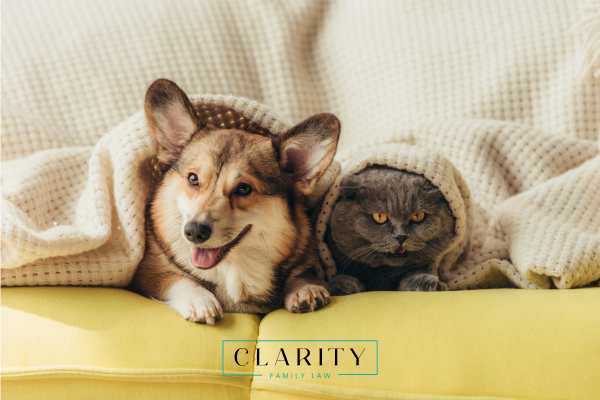Divorcing couples often argue over what happens to their pets. Pets are treated like other assets in many cases, with one party getting ownership and financial responsibility. Some states consider the pet's best interests, considering factors like who takes care of it and can provide the best living conditions.
Sometimes joint ownership is an option, with both parties responsible for veterinary care and costs. Other times, one spouse gets full custody and pays for everything. Pets don't have legal guardians, so it's up to the spouses to reach an agreement or go to court.
Contact Clarity Law Firm's Dearborn divorce attorneys for more information regarding divorce laws and custody arrangements for pet owners. Call us at (313) 513-1919 today to schedule a free consultation.
How Do Traditional Rules on Property Division in Divorce Apply to Pets?
When getting a divorce, pets are treated differently than other property. Pets are considered personal property and not divided like cars or furniture.
Instead, the courts apply traditional property division rules to the financial costs of pet care. This includes food, vet bills, grooming, and other pet expenses. In some states, one spouse may have to pay spousal support for pets if they were a marital asset and both spouses contributed financially to their care.
What Happens to Pets in a Divorce?
Pets can play an important role in our lives, and it can be difficult to determine what should happen to them during a divorce. While most states do not consider pets to be property in the same way as other items that have to be divided, there are still decisions that must be made about who will care for them after a divorce.
When deciding what will happen to a pet, it is important to consider the best interests of the animal. This includes factors such as which spouse has been historically responsible for the pet’s care and which one can provide a better home environment.

In some states, a judge may consider the emotional bond between each spouse and the pet when making their decision, particularly if the pet is a service animal or companion animal.
Ultimately, if both parties agree on an arrangement that is in the best interests of the pet's well-being, they can agree outside of court. Otherwise, a judge can decide who will get custody of the pet and who will be responsible for covering its related costs.
What Factors Will the Court Use to Determine Pet Custody?
When couples going through a divorce have pets, many judges consider who should be awarded custody of the animal(s). This situation often leads to heated debates between both parties. Typically, the court will consider several factors when determining pet custody disputes during a divorce.
One factor that may influence the court’s decision is who was primarily responsible for taking care of the pet before the divorce. If one spouse was more involved in the pet’s care, they may be more likely to receive custody of the animal.
The court may also consider who can provide the pet with a better home environment. This means taking into account factors such as living space, financial stability, and ability to provide proper care.
Finally, the court will usually take into account the emotional bond that each spouse may have with the pet. If one spouse is more emotionally attached to the pet, they may be more likely to receive custody of it.
How Can I Prove That a Pet is Separate Property?
When it comes to divorce proceedings, pets are often treated as shared property, and their ownership is subject to the same laws as any other type of asset. In some states, pets are considered “marital assets” and must be divided equitably according to the law. If a court determines that the pet is marital property, then it will be split between both parties in the divorce.
Can I Sue for Pet Ownership?
In a divorce, it can be difficult to decide who gets custody of the family pet. Pets are typically treated as property in legal proceedings, so they are subject to the same division process as other assets. This means that if both parties want to keep the pet, then a judge may have to decide on who will retain ownership.
In some states, couples can agree about who will keep the pet in a settlement agreement or they can try to reach an out-of-court resolution. In certain cases, one spouse may even be able to sue for pet ownership if they can prove that the animal is separate property. This usually requires being able to prove that the pet was owned before getting married and it has not been shared between both spouses since then.
Who Gets Service and Emotional Support Animals in Divorce?
When a married couple decides to divorce, they will have to make decisions regarding the division of their assets. This includes any pets that may be part of the family. Determining who gets custody of a pet can be a difficult process and can often lead to uncertainty and distress for both parties. In some cases, one spouse may claim ownership of the pet while the other claims visitation rights.
Can I Get Visitation for My Pet if My Ex-spouse Got Custody of It?
When a couple gets divorced, the court will typically treat any pets as marital property. This means that the court will aim to divide the pet between both parties in a manner that is fair and equitable. In most cases, if one party has primary custody of the animal, then they may be awarded ownership of it.

Depending on the pet custody laws in your state, you may have the opportunity to seek visitation rights for the pet if you are not awarded primary custody. This means that both parties will still have the chance to spend time with the pet but one party will maintain legal ownership.
What is a Petnup?
A Petnup is a term used to describe a postnuptial agreement between two divorcing parties that outlines the arrangement for pet custody. A Petnup can help ease the emotional stress of a divorce by providing clear guidelines on who will get ownership of the pet, as well as how visitation rights and other related expenses will be handled. It can even include provisions for pet insurance and medical costs if so desired.
A Petnup is a great way to ensure that both parties are in agreement on the division of their pet and can reduce stress related to the divorce process in Michigan.
Can an Attorney Help Me Keep My Pet in a Divorce?
When going through a divorce, one of the biggest concerns is what will happen to your beloved pet. As pets are increasingly being treated like family members, it is important to ensure you have an advocate who understands the legal implications of keeping your furry friend during and after the divorce proceedings.
A family law lawyer from Clarity can provide experienced guidance and help you understand your rights regarding pet custody. Whether you are negotiating a Petnup or advocating for pet ownership due to pet custody issues, Clarity Law Firm is here to help.